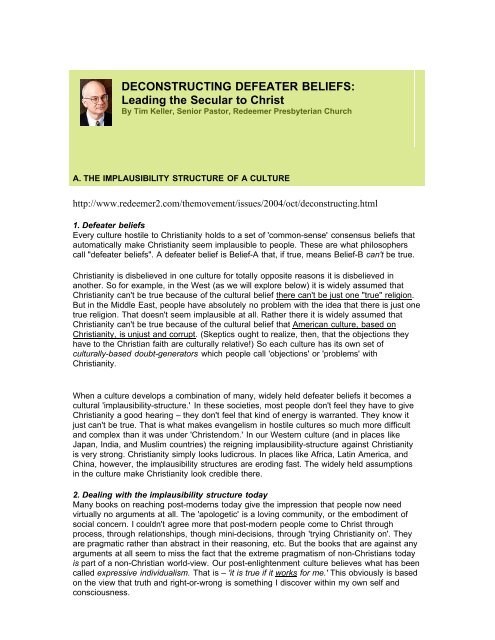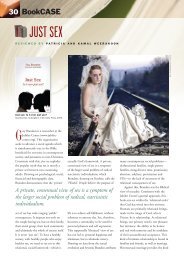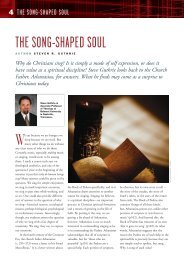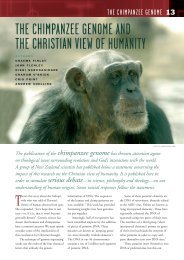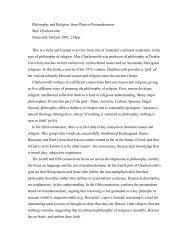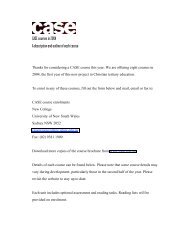Deconstructing Defeater Beliefs: Leading the Secular to Christ - CASE
Deconstructing Defeater Beliefs: Leading the Secular to Christ - CASE
Deconstructing Defeater Beliefs: Leading the Secular to Christ - CASE
- No tags were found...
Create successful ePaper yourself
Turn your PDF publications into a flip-book with our unique Google optimized e-Paper software.
DECONSTRUCTING DEFEATER BELIEFS:<br />
<strong>Leading</strong> <strong>the</strong> <strong>Secular</strong> <strong>to</strong> <strong>Christ</strong><br />
By Tim Keller, Senior Pas<strong>to</strong>r, Redeemer Presbyterian Church<br />
A. THE IMPLAUSIBILITY STRUCTURE OF A CULTURE<br />
http://www.redeemer2.com/<strong>the</strong>movement/issues/2004/oct/deconstructing.html<br />
1. <strong>Defeater</strong> beliefs<br />
Every culture hostile <strong>to</strong> <strong>Christ</strong>ianity holds <strong>to</strong> a set of 'common-sense' consensus beliefs that<br />
au<strong>to</strong>matically make <strong>Christ</strong>ianity seem implausible <strong>to</strong> people. These are what philosophers<br />
call "defeater beliefs". A defeater belief is Belief-A that, if true, means Belief-B can't be true.<br />
<strong>Christ</strong>ianity is disbelieved in one culture for <strong>to</strong>tally opposite reasons it is disbelieved in<br />
ano<strong>the</strong>r. So for example, in <strong>the</strong> West (as we will explore below) it is widely assumed that<br />
<strong>Christ</strong>ianity can't be true because of <strong>the</strong> cultural belief <strong>the</strong>re can't be just one "true" religion.<br />
But in <strong>the</strong> Middle East, people have absolutely no problem with <strong>the</strong> idea that <strong>the</strong>re is just one<br />
true religion. That doesn't seem implausible at all. Ra<strong>the</strong>r <strong>the</strong>re it is widely assumed that<br />
<strong>Christ</strong>ianity can't be true because of <strong>the</strong> cultural belief that American culture, based on<br />
<strong>Christ</strong>ianity, is unjust and corrupt. (Skeptics ought <strong>to</strong> realize, <strong>the</strong>n, that <strong>the</strong> objections <strong>the</strong>y<br />
have <strong>to</strong> <strong>the</strong> <strong>Christ</strong>ian faith are culturally relative!) So each culture has its own set of<br />
culturally-based doubt-genera<strong>to</strong>rs which people call 'objections' or 'problems' with<br />
<strong>Christ</strong>ianity.<br />
When a culture develops a combination of many, widely held defeater beliefs it becomes a<br />
cultural 'implausibility-structure.' In <strong>the</strong>se societies, most people don't feel <strong>the</strong>y have <strong>to</strong> give<br />
<strong>Christ</strong>ianity a good hearing – <strong>the</strong>y don't feel that kind of energy is warranted. They know it<br />
just can't be true. That is what makes evangelism in hostile cultures so much more difficult<br />
and complex than it was under '<strong>Christ</strong>endom.' In our Western culture (and in places like<br />
Japan, India, and Muslim countries) <strong>the</strong> reigning implausibility-structure against <strong>Christ</strong>ianity<br />
is very strong. <strong>Christ</strong>ianity simply looks ludicrous. In places like Africa, Latin America, and<br />
China, however, <strong>the</strong> implausibility structures are eroding fast. The widely held assumptions<br />
in <strong>the</strong> culture make <strong>Christ</strong>ianity look credible <strong>the</strong>re.<br />
2. Dealing with <strong>the</strong> implausibility structure <strong>to</strong>day<br />
Many books on reaching post-moderns <strong>to</strong>day give <strong>the</strong> impression that people now need<br />
virtually no arguments at all. The 'apologetic' is a loving community, or <strong>the</strong> embodiment of<br />
social concern. I couldn't agree more that post-modern people come <strong>to</strong> <strong>Christ</strong> through<br />
process, through relationships, though mini-decisions, through 'trying <strong>Christ</strong>ianity on'. They<br />
are pragmatic ra<strong>the</strong>r than abstract in <strong>the</strong>ir reasoning, etc. But <strong>the</strong> books that are against any<br />
arguments at all seem <strong>to</strong> miss <strong>the</strong> fact that <strong>the</strong> extreme pragmatism of non-<strong>Christ</strong>ians <strong>to</strong>day<br />
is part of a non-<strong>Christ</strong>ian world-view. Our post-enlightenment culture believes what has been<br />
called expressive individualism. That is – 'it is true if it works for me.' This obviously is based<br />
on <strong>the</strong> view that truth and right-or-wrong is something I discover within my own self and<br />
consciousness.
What <strong>the</strong>n of <strong>the</strong> claim that "post-modern people don't want arguments – <strong>the</strong>y just want <strong>to</strong><br />
see if it works for <strong>the</strong>m" All right – as with any form of contextualization, let us as<br />
evangelists enter – adapt partially – <strong>to</strong> <strong>the</strong> culture of expressive individualism. Let us show<br />
<strong>the</strong>m <strong>the</strong> reality of changed lives. Let us use narratives ra<strong>the</strong>r than long strings of logic. But<br />
at some point you must also challenge <strong>the</strong> sovereignty of individual consciousness. Jesus is<br />
Lord, not my personal consciousness. At some point, <strong>the</strong> idea that "it is true if and only if it<br />
works for me" must be challenged. We have <strong>to</strong> say: "Ultimately that is correct – in <strong>the</strong> very,<br />
very long run, obeying <strong>the</strong> truth will 'work' and bring you <strong>to</strong> glory and disobeying <strong>the</strong> truth will<br />
'not work' and bring you <strong>to</strong> ruin. But in <strong>the</strong> short run (like – even throughout all <strong>the</strong> rest of<br />
your life!) obeying <strong>the</strong> truth might lead <strong>to</strong> ostracism, persecution, or o<strong>the</strong>r suffering.<br />
There have been many times in New York City that I have seen people make professions of<br />
faith that seemed quite heart-felt, but when faced with serious consequences if <strong>the</strong>y<br />
maintained <strong>the</strong>ir identification with <strong>Christ</strong> (e.g. missing <strong>the</strong> opportunity for a new sexual<br />
partner or some major professional setback) <strong>the</strong>y bailed on <strong>the</strong>ir <strong>Christ</strong>ian commitment. The<br />
probable reason was that <strong>the</strong>y had not undergone deeper 'world-view change'. They had<br />
fitted <strong>Christ</strong> <strong>to</strong> <strong>the</strong>ir individualistic world-view ra<strong>the</strong>r than fitting <strong>the</strong>ir world-view <strong>to</strong> <strong>Christ</strong>.<br />
They professed faith simply because <strong>Christ</strong>ianity worked for <strong>the</strong>m, and not because <strong>the</strong>y<br />
grasped it as true whe<strong>the</strong>r it is 'working' for <strong>the</strong>m this year or not! They had not experienced<br />
a 'power-encounter' between <strong>the</strong> gospel and <strong>the</strong>ir individualistic world-view. I think<br />
apologetics does need <strong>to</strong> be 'post-modern.' It does need <strong>to</strong> adapt <strong>to</strong> post-modern<br />
sensibilities. But it must challenge those sensibilities <strong>to</strong>o. There do need <strong>to</strong> be 'arguments.'<br />
<strong>Christ</strong>ianity must be perceived <strong>to</strong> be true, even though less rationalistic cultures will not<br />
demand watertight proofs like <strong>the</strong> older high-modern western society did.<br />
B. A 'SANDWICH' APPROACH TO SHARING THE GOSPEL<br />
1. Two parts <strong>to</strong> sharing <strong>the</strong> gospel<br />
What this means now is that <strong>the</strong>re are two parts <strong>to</strong> sharing <strong>the</strong> gospel in a particular culture –<br />
a more 'negative' and a more positive aspect.<br />
a) The more negative aspect has <strong>to</strong> do with 'apologetics' – it consists in deconstructing <strong>the</strong><br />
culture's implausibility structure. In short, this means you have <strong>to</strong> show on <strong>the</strong> culture's<br />
own terms (that is, by its own definitions of justice, rationality, meaning) that its objections <strong>to</strong><br />
<strong>Christ</strong>ianity don't hold up.<br />
b) The more positive aspect of sharing <strong>the</strong> gospel is <strong>to</strong> connect <strong>the</strong> s<strong>to</strong>ry of Jesus <strong>to</strong> <strong>the</strong><br />
base-line cultural narratives. In short, you have <strong>to</strong> show in line with <strong>the</strong> culture's own (best)<br />
aspirations, hopes, and convictions that its own cultural s<strong>to</strong>ry won't be resolved or have 'a<br />
happy ending' outside of <strong>Christ</strong>.<br />
2. A sandwich of three layers<br />
But I think <strong>the</strong> overall best way <strong>to</strong> 'present <strong>the</strong> gospel' is a kind of 'sandwich' approach <strong>to</strong><br />
<strong>the</strong>se two parts. The following assumes <strong>the</strong>re is a process and a series of conversations<br />
between you and <strong>the</strong> person who doesn't believe.<br />
a) Brief gospel summary. First, <strong>the</strong> gospel must be presented briefly but so vividly and<br />
attractively (and so hooked in<strong>to</strong> <strong>the</strong> culture's base-line cultural narratives) that <strong>the</strong> listener is<br />
virtually compelled <strong>to</strong> say "It would be wonderful if that were true, but it can't be!" Until he or<br />
she comes <strong>to</strong> that position, you can't work on <strong>the</strong> implausibility structure! The listener must<br />
have motivation <strong>to</strong> hear you out. That is what defeaters do – <strong>the</strong>y make people superimpatient<br />
with any case for <strong>Christ</strong>ianity. Unless <strong>the</strong>y find a presentation of <strong>Christ</strong> surprisingly
attractive and compelling (and stereo-type breaking) <strong>the</strong>ir eyes will simply glaze over when<br />
you try <strong>to</strong> talk <strong>to</strong> <strong>the</strong>m.<br />
b) Dismantle plausibility structure. Alvin Plantinga wisely asserts that people avoid<br />
<strong>Christ</strong>ianity not because <strong>the</strong>y have really examined its teachings and found <strong>the</strong>m wanting,<br />
but because <strong>the</strong>ir culture gives huge plausibility (by <strong>the</strong> media, through art, through <strong>the</strong><br />
expertise and impressive credentials of its spokespersons) <strong>to</strong> believe a series of defeater<br />
beliefs that <strong>the</strong>y know are true, and since <strong>the</strong>y are true, <strong>Christ</strong>ianity can't be. The leading<br />
defeaters must be dealt with clearly and quickly but convincingly. <strong>Defeater</strong>s are dealt with<br />
when <strong>the</strong> person feels you have presented <strong>the</strong> objection <strong>to</strong> <strong>Christ</strong>ianity in a clearer and<br />
stronger way than <strong>the</strong>y could have done it.<br />
c) Longer explanation of <strong>the</strong> person and work of <strong>Christ</strong>. Now, if people find you have at<br />
least undermined <strong>the</strong> defeaters in a listener's mind, you can now return <strong>to</strong> talking at greater<br />
length about creation, fall, redemption, and res<strong>to</strong>ration. If you try <strong>to</strong> do apologetics before<br />
you pull off a quick, attractive presentation of <strong>Christ</strong>, people's eyes will glaze over and <strong>the</strong>y<br />
will become bored. But if you try <strong>to</strong> do a very lengthy explanation of <strong>the</strong> meaning of <strong>Christ</strong>'s<br />
cross and resurrection before you convincingly deal with <strong>the</strong> defeaters, <strong>the</strong>y won't listen <strong>to</strong><br />
you ei<strong>the</strong>r.<br />
Summary of <strong>the</strong> approach:<br />
1. The attractive gospel – Brief gospel connected <strong>to</strong> baseline narratives<br />
2. Why <strong>Christ</strong>ianity can be true- Dismantling doubts and defeaters<br />
3. The Biblical s<strong>to</strong>ry of <strong>the</strong> gospel – A more thorough telling<br />
C. THE PROCESS<br />
1. The gospel connected <strong>to</strong> baseline cultural narratives<br />
The doctrines of creation, sin, grace, and faith must be presented in connection with<br />
'baseline cultural narratives' – Jesus must be <strong>the</strong> answer <strong>to</strong> <strong>the</strong> questions <strong>the</strong> culture is<br />
asking. Don't forget – every gospel presentation presents Jesus as <strong>the</strong> answer <strong>to</strong> some set<br />
of human-cultural questions, like 'how can I be forgiven' (Western moral individualism) or<br />
'how can I be free' (post-modern expressive individualism) or 'how can we over come evil<br />
forces in <strong>the</strong> world' (contemporary Africans) etc. Every gospel presentation has <strong>to</strong> be<br />
culturally incarnated, it must assume some over-riding cultural concern, so we may as well<br />
be engaged with <strong>the</strong> ones that we face! <strong>Christ</strong>ianity must be presented as answers <strong>to</strong> <strong>the</strong><br />
main questions and aspirations of our culture. Two of <strong>the</strong> over-riding concerns are:<br />
a) Cultural concerns. First a concern for personal freedom and identity. Contemporary<br />
people ask: Who am I I'm not completely sure – but I do know I have <strong>to</strong> be free <strong>to</strong> create my<br />
own identity and sense of self. Whatever spirituality I have, it must leave me free <strong>to</strong><br />
experiment and seek and not be a 'one size fits all.'<br />
Second, a concern for unity in diversity. Contemporary people ask: How can we get past<br />
exclusion and exclusivism How can we live at peace in a pluralistic world How can we<br />
share power ra<strong>the</strong>r than using power <strong>to</strong> dominate one ano<strong>the</strong>r How can we embrace <strong>the</strong><br />
'O<strong>the</strong>r' – <strong>the</strong> person of a sharply different viewpoint and culture<br />
b) Gospel resources. Gospel resources for personal freedom. Kierkegaard's depicts sin in<br />
The Sickness un<strong>to</strong> Death – as 'building your identity on anything but God' which leads <strong>to</strong><br />
internal slavery and narrowness of spirit. This is a gospel presentation that connects well<br />
<strong>to</strong>day. (Kierkegaard, like Nietzsche and o<strong>the</strong>r great thinkers, was a good century 'ahead of<br />
his time.') Kierkegaard also deconstructed mere religion and moralism and contrasted <strong>the</strong>m<br />
with <strong>the</strong> gospel. (See his Three ways of life: <strong>the</strong> aes<strong>the</strong>tic, <strong>the</strong> ethical, and <strong>the</strong> spiritual.)
Building your identity on any finite created thing besides God leads <strong>to</strong> <strong>the</strong> idolization of that<br />
fac<strong>to</strong>r and <strong>the</strong> demonization of anyone who lacks it.<br />
Gospel resources for living at peace. If you build your identity mainly on your class, or race,<br />
or culture, or performance you will necessarily vilify and disdain anyone who lacks what you<br />
consider <strong>the</strong> corners<strong>to</strong>ne of your own significance. Therefore, building your identity on God<br />
leads <strong>to</strong> hatred of <strong>the</strong> o<strong>the</strong>r, <strong>to</strong> social conflict and oppression. Jonathan Edwards (again, a<br />
man ahead of his time) recognized that if your highest love and greatest is your nation, your<br />
family, your career, even your religious performance, <strong>the</strong>n you will disdain o<strong>the</strong>r nations,<br />
families, classes of people, and o<strong>the</strong>r religions. If anything but God is our "highest good" (i.e.<br />
if we make anything an idol) <strong>the</strong>n we have <strong>to</strong> demonize or at least exclude some part of<br />
creation. But if God is our ultimate good, <strong>the</strong>n we are free <strong>to</strong> develop deep love for (what<br />
Edwards calls) "Being in general." If we truly made <strong>the</strong> Lord our ultimate beauty and Savior<br />
and good – we would have an equal love and joy equally in all creation, all individuals, all<br />
people groups, even in all nature and created things.<br />
In any case, <strong>the</strong>re is no religion with a more powerful ground-motif for accepting enemies<br />
and <strong>the</strong> 'O<strong>the</strong>r' than <strong>Christ</strong>ianity. We are <strong>the</strong> only faith that has at its heart a man dying for<br />
his enemies, forgiving <strong>the</strong>m ra<strong>the</strong>r than destroying <strong>the</strong>m. This must be presented <strong>to</strong> our<br />
culture as an unparalleled resource for living in peace in a pluralistic society.<br />
Summary<br />
As we said above, people's eyes will 'glaze over' if you start your presentation with 'reasons<br />
<strong>Christ</strong>ianity is true'. <strong>Christ</strong>ianity must be attractive <strong>to</strong> people before <strong>the</strong>y will sit still for a<br />
presentation of intellectual credibility. A person must come <strong>to</strong> <strong>the</strong> point where he or she says,<br />
"that would be great if it were true – but is it" Then and only <strong>the</strong>n will <strong>the</strong>y sit still for a<br />
discussion on why <strong>Christ</strong>ianity is true. So <strong>Christ</strong>ianity has <strong>to</strong> first be presented attractively<br />
and compellingly. We must show post-modern western culture – with its aspirations for<br />
personal freedom and unity in diversity – that its 'S<strong>to</strong>ry' can only have a 'happy ending' in<br />
Jesus <strong>Christ</strong>. Then we can deal with <strong>the</strong> main objections (<strong>the</strong> 'defeaters') in our culture that<br />
make it hard <strong>to</strong> believe that <strong>Christ</strong>ianity is true.
Here is an example of a brief gospel presentation:<br />
Why we are here. The one God is a community – a Trinity of three persons who each<br />
perfectly know and defer <strong>to</strong> one ano<strong>the</strong>r and love one ano<strong>the</strong>r and <strong>the</strong>refore have<br />
infinite joy and glory and peace. God made a good, beautiful world filled with beings<br />
who share in this life of joy and peace by knowing, serving, and loving God and one<br />
ano<strong>the</strong>r.<br />
What went wrong. Instead, we chose <strong>to</strong> center our lives on ourselves and on <strong>the</strong><br />
pursuit of things ra<strong>the</strong>r than on God and o<strong>the</strong>rs. This has led <strong>to</strong> <strong>the</strong> disintegration of<br />
creation and <strong>the</strong> loss of peace – within ourselves, between ourselves, and in nature<br />
itself. War, hunger, poverty, injustice, racism, bitterness, meaninglessness, despair,<br />
sickness, and death all are symp<strong>to</strong>ms.<br />
What puts <strong>the</strong> world right. But though God lost us he determined <strong>to</strong> win us back. He<br />
entered his<strong>to</strong>ry in <strong>the</strong> person of Jesus in order <strong>to</strong> deal with all <strong>the</strong> causes and results of<br />
our broken relationship with him. By his sacrificial life and death he both exemplifies <strong>the</strong><br />
life we must live and rescues us from <strong>the</strong> life we have lived. By his resurrection he<br />
proved who he was and showed us <strong>the</strong> future — new bodies and a completely renewed<br />
and res<strong>to</strong>red new heavens and new earth in which <strong>the</strong> world is res<strong>to</strong>red <strong>to</strong> full joy,<br />
justice, peace, and glory.<br />
How we can be part of putting <strong>the</strong> world right. Between his first coming <strong>to</strong> win us<br />
and his last coming <strong>to</strong> res<strong>to</strong>re us we live by faith in him. When we believe and rely on<br />
Jesus' work and record (ra<strong>the</strong>r than ours) for our relationship <strong>to</strong> God, his healing<br />
kingdom power comes upon us and begins <strong>to</strong> work through us. <strong>Christ</strong> gives us a<br />
radically new identity, freeing us from both self-righteousness and self-condemnation.<br />
This liberates us <strong>to</strong> accept people we once excluded, and <strong>to</strong> break <strong>the</strong> bondage of<br />
things (even good things) that once drove us. He puts us in<strong>to</strong> a new community of<br />
people which gives a partial, but real, foretaste of <strong>the</strong> healing of <strong>the</strong> world that God will<br />
accomplish when Jesus returns<br />
2. <strong>Deconstructing</strong> <strong>the</strong> implausibility structure<br />
What are <strong>the</strong> dominant defeaters in contemporary Western civilization These are <strong>the</strong><br />
dominant defeaters discovered in a recent survey I did of young under 25 year olds in NYC<br />
who are not <strong>Christ</strong>ian. Below six 'defeaters' are stated and answered in a nutshell. Why<br />
<strong>Christ</strong>ianity can't be true – because of:<br />
a) The o<strong>the</strong>r religions. <strong>Christ</strong>ians seem <strong>to</strong> greatly over-play <strong>the</strong> differences between <strong>the</strong>ir<br />
faith and all <strong>the</strong> o<strong>the</strong>r ones. Though millions of people in o<strong>the</strong>r religions say <strong>the</strong>y have<br />
encountered God, have built marvelous civilizations and cultures, and have had <strong>the</strong>ir lives<br />
and characters changed by <strong>the</strong>ir experience of faith, <strong>Christ</strong>ians insist that only <strong>the</strong>y go <strong>to</strong><br />
heaven — that <strong>the</strong>ir religion is <strong>the</strong> only one that is 'right' and true. The exclusivity of this is<br />
breath taking. It also appears <strong>to</strong> many <strong>to</strong> be a threat <strong>to</strong> international peace.<br />
Brief response: Inclusivism is really covert exclusivism. It is common <strong>to</strong> hear people say:<br />
"No one should insist <strong>the</strong>ir view of God better than all <strong>the</strong> rest. Every religion is equally valid."<br />
But what you just said could only be true if: First, <strong>the</strong>re is no God at all, or second, God is an<br />
impersonal force that doesn't care what your doctrinal beliefs about him are. So as you
speak you are assuming (by faith!) a very particular view of God and you are pushing it as<br />
better than <strong>the</strong> rest! That is at best inconsistent and at worst hypocritical, since you are doing<br />
<strong>the</strong> very thing you are forbidding. To say "all religions are equally valid" is itself a very white,<br />
Western view based in <strong>the</strong> European enlightenment's idea of knowledge and values. Why<br />
should that view be privileged over anyone else's<br />
b) Evil and suffering. <strong>Christ</strong>ianity teaches <strong>the</strong> existence of an all-powerful, all-good and<br />
loving God. But how can that belief be reconciled with <strong>the</strong> horrors that occur daily If <strong>the</strong>re is<br />
a God, he must be ei<strong>the</strong>r all-powerful but not good enough <strong>to</strong> want an end <strong>to</strong> evil and<br />
suffering, or he's all-good but not powerful enough <strong>to</strong> bring an end <strong>to</strong> evil and suffering.<br />
Ei<strong>the</strong>r way <strong>the</strong> God of <strong>the</strong> Bible couldn't exist. For many people, this is not only an<br />
intellectual conundrum but also an intensely personal problem. Their own personal lives are<br />
marred by tragedy, abuse, and injustice.<br />
Brief response: If God himself has suffered our suffering isn't senseless. First, if you have a<br />
God great and transcendent enough <strong>to</strong> be mad at because he hasn't s<strong>to</strong>pped evil and<br />
suffering in <strong>the</strong> world, <strong>the</strong>n you have <strong>to</strong> (at <strong>the</strong> same moment) have a God great and<br />
transcendent enough <strong>to</strong> have good reasons for allowing it <strong>to</strong> continue that you can't know.<br />
(You can't have it both ways.) Second, though we don't know <strong>the</strong> reasons why he allows it <strong>to</strong><br />
continue, he can't be indifferent or un-caring, because <strong>the</strong> <strong>Christ</strong>ian God (unlike <strong>the</strong> gods of<br />
all <strong>the</strong> o<strong>the</strong>r religions) takes our misery and suffering so seriously that he is willing <strong>to</strong> get<br />
involved with it himself. On <strong>the</strong> cross, Jesus suffered with us.<br />
c) The ethical straitjacket. In <strong>Christ</strong>ianity <strong>the</strong> Bible and <strong>the</strong> church dictate everything that a<br />
<strong>Christ</strong>ian must believe, feel, and do. <strong>Christ</strong>ians are not encouraged <strong>to</strong> make <strong>the</strong>ir own moral<br />
decisions, or <strong>to</strong> think out <strong>the</strong>ir beliefs or patterns of life for <strong>the</strong>mselves. In a fiercely pluralistic<br />
society <strong>the</strong>re are <strong>to</strong>o many options, <strong>to</strong>o many cultures, <strong>to</strong>o many personality differences for<br />
this approach. We must be free <strong>to</strong> choose for ourselves how <strong>to</strong> live — this is <strong>the</strong> only truly<br />
au<strong>the</strong>ntic life. We should only feel guilty if we are not being true <strong>to</strong> ourselves — <strong>to</strong> our own<br />
chosen beliefs and practices and values and vision for life.<br />
Brief response: Individual creation of truth removes <strong>the</strong> right <strong>to</strong> moral outrage. 1) Aren't<br />
<strong>the</strong>re any people in <strong>the</strong> world who are doing things you believe are wrong that <strong>the</strong>y should<br />
s<strong>to</strong>p doing no matter what <strong>the</strong>y believe inside about right and wrong Then you do believe<br />
that <strong>the</strong>re is some kind of moral obligation that people should abide by and which stands in<br />
judgment over <strong>the</strong>ir internal choices and convictions. So what is wrong with <strong>Christ</strong>ians doing<br />
that 2) No one is really free anyway. We all have <strong>to</strong> live for something, and whatever our<br />
ultimate meaning in life is (whe<strong>the</strong>r approval, achievement, a love relationship, our work) it is<br />
basically our 'lord' and master. Everyone is ultimately in a spiritual straitjacket. Even <strong>the</strong> most<br />
independent people are dependent on <strong>the</strong>ir independence and so can't commit. <strong>Christ</strong>ianity<br />
gives you a lord and master who forgives and dies for you.<br />
d) The record of <strong>Christ</strong>ians. Every religion will have its hypocrites of course. But it seems<br />
that <strong>the</strong> most fervent <strong>Christ</strong>ians are <strong>the</strong> most condemning, exclusive, and in<strong>to</strong>lerant. The<br />
church has a his<strong>to</strong>ry of supporting injustices, of destroying culture, of oppression. And <strong>the</strong>re<br />
are so many people who are not <strong>Christ</strong>ian (or not religious at all) who appear <strong>to</strong> be much<br />
more kind, caring, and indeed moral than so many <strong>Christ</strong>ians. If <strong>Christ</strong>ianity is <strong>the</strong> true<br />
religion — <strong>the</strong>n why can this be Why would so much oppression have been carried out over<br />
<strong>the</strong> centuries in <strong>the</strong> name of <strong>Christ</strong> and with <strong>the</strong> support of <strong>the</strong> church<br />
Brief response: The solution <strong>to</strong> injustices is not less but deeper <strong>Christ</strong>ianity. 1) There have<br />
been terrible abuses. 2) But in <strong>the</strong> prophets and <strong>the</strong> gospels we are given <strong>to</strong>ols for a<br />
devastating critique of moralistic religion. Scholars have shown that Marx and Nietzsche's<br />
critique of religion relied on <strong>the</strong> ideas of <strong>the</strong> prophets. So despite its abuses, <strong>Christ</strong>ianity
provides perhaps greater <strong>to</strong>ols than <strong>the</strong> o<strong>the</strong>r religions do for its own critique. 3) When Martin<br />
Lu<strong>the</strong>r King, Jr. confronted terrible abuses by <strong>the</strong> white church he did not call <strong>the</strong>m <strong>to</strong> loosen<br />
<strong>the</strong>ir <strong>Christ</strong>ian commitments. He used <strong>the</strong> Bible's provision for church self-critique and called<br />
<strong>the</strong>m <strong>to</strong> truer, firmer, deeper <strong>Christ</strong>ianity.<br />
e) The angry God. <strong>Christ</strong>ianity seems <strong>to</strong> be built around <strong>the</strong> concept of a condemning,<br />
judgmental deity. For example, <strong>the</strong>re's <strong>the</strong> cross — <strong>the</strong> teaching that <strong>the</strong> murder of one man<br />
(Jesus) leads <strong>to</strong> <strong>the</strong> forgiveness of o<strong>the</strong>rs. But why can't God just forgive us The God of<br />
<strong>Christ</strong>ianity seems a left-over from primitive religions where peevish gods demanded blood in<br />
order <strong>to</strong> assuage <strong>the</strong>ir wrath.<br />
Brief response: On <strong>the</strong> cross God does not demand our blood but offers his own. 1) All<br />
forgiveness of any deep wrong and injustice entails suffering on <strong>the</strong> forgiver's part. If<br />
someone truly wrongs you, because of our deep sense of justice, we can't just shrug it off.<br />
We sense <strong>the</strong>re's a 'debt.' We can <strong>the</strong>n ei<strong>the</strong>r a) make <strong>the</strong> perpetra<strong>to</strong>r pay down <strong>the</strong> debt<br />
you feel (as you take it out of his hide in vengeance!) in which case evil spreads in<strong>to</strong> us and<br />
hardens us b) or you can forgive – but that is enormously difficult. But that is <strong>the</strong> only way <strong>to</strong><br />
s<strong>to</strong>p <strong>the</strong> evil from hardening us as well. 2) If we can't forgive without suffering (because of<br />
our sense of justice) its not surprising <strong>to</strong> learn that God couldn't forgive us without suffering<br />
— coming in <strong>the</strong> person of <strong>Christ</strong> and dying on <strong>the</strong> cross.<br />
f) The unreliable Bible. It seems impossible any longer <strong>to</strong> take <strong>the</strong> Bible as completely<br />
authoritative in <strong>the</strong> light of modern science, his<strong>to</strong>ry, and culture. Also we can't be sure what<br />
in <strong>the</strong> Bible's accounts of events is legendary and what really happened. Finally, much of <strong>the</strong><br />
Bible's social teaching (for example, about women) is socially regressive. So how can we<br />
trust it scientifically, his<strong>to</strong>rically, and socially<br />
Brief response: The gospels' form precludes <strong>the</strong>ir being legends. The Biblical gospels are<br />
not legends but his<strong>to</strong>rically reliable accounts about Jesus' life. Why 1) Their timing is far <strong>to</strong>o<br />
early for <strong>the</strong>m <strong>to</strong> be legends. The gospels, however, were written 30-60 years after Jesus'<br />
death – and Paul's letters, which support all <strong>the</strong> accounts, came just 20 years after <strong>the</strong><br />
events. 2) Their content is far <strong>to</strong>o counter-productive <strong>to</strong> be legends. The accounts of Jesus<br />
crying out that God had abandoned him, or <strong>the</strong> resurrection where all <strong>the</strong> witnesses were<br />
women — did not help <strong>Christ</strong>ianity in <strong>the</strong> eyes of first century readers. The only his<strong>to</strong>rically<br />
plausible reason that <strong>the</strong>se incidents are recorded is that <strong>the</strong>y happened. The 'offensiveness'<br />
of <strong>the</strong> Bible is culturally relative. Texts you find difficult and offensive are 'common sense' <strong>to</strong><br />
people in o<strong>the</strong>r cultures. And many of <strong>the</strong> things you find offensive because of your beliefs<br />
and convictions, many will seem silly <strong>to</strong> your grandchildren just as many of your<br />
grandparents' beliefs offend you. Therefore, <strong>to</strong> simply reject any Scripture is <strong>to</strong> assume your<br />
culture (and worse yet, your time in his<strong>to</strong>ry) is superior <strong>to</strong> all o<strong>the</strong>rs. It is narrow-minded in<br />
<strong>the</strong> extreme.
Two final notes on dealing with 'doubts' and 'defeaters.'<br />
It is critical <strong>to</strong> state <strong>the</strong>se defeaters in <strong>the</strong> strongest possible way. If a non-<br />
<strong>Christ</strong>ian hears you express <strong>the</strong>m and says, "that's better than I could have put<br />
it" <strong>the</strong>n <strong>the</strong>y will feel that <strong>the</strong>y are being respected and will take your answer<br />
more seriously. You will need <strong>to</strong> have good answers <strong>to</strong> <strong>the</strong>se defeaters woven<br />
in redundantly <strong>to</strong> everything you say and teach in <strong>the</strong> church.<br />
Our purpose with <strong>the</strong>se defeaters or doubts is not <strong>to</strong> 'answer' <strong>the</strong>m or 'refute'<br />
<strong>the</strong>m but <strong>to</strong> deconstruct <strong>the</strong>m. That is, <strong>to</strong> "show that <strong>the</strong>y are not as solid or as<br />
natural as <strong>the</strong>y first appear" (Kevin Vanhoozer). It is important <strong>to</strong> show that all<br />
doubts and objections <strong>to</strong> <strong>Christ</strong>ianity are really alternate beliefs and faith-acts<br />
about <strong>the</strong> world. (If you say, "I just can't believe that <strong>the</strong>re is only one true<br />
religion" — that is a faith-act. You can't prove that.) And when you see your<br />
doubts are really beliefs, and when you require <strong>the</strong> same amount of evidence<br />
for <strong>the</strong>m that you are asking of <strong>Christ</strong>ian beliefs, <strong>the</strong>n it becomes evident many<br />
of <strong>the</strong>m are very weak and largely adopted because of cultural pressure.<br />
3. Steps in<strong>to</strong> faith<br />
What about <strong>the</strong> positive If you are ready <strong>to</strong> move <strong>to</strong>ward <strong>the</strong> exploration of faith in<br />
<strong>Christ</strong>ianity, you must be –<br />
a) <strong>Deconstructing</strong> doubt. Your<br />
doubts are really beliefs, and you<br />
can't avoid betting your life and<br />
destiny on some kind of belief in<br />
God and <strong>the</strong> universe. Noncommitment<br />
is impossible. Faithacts<br />
are inevitable.<br />
b) Knowing <strong>the</strong>re's God. You<br />
actually already believe in God at<br />
<strong>the</strong> deep level, whatever you tell<br />
yourself intellectually. Our<br />
outrage against injustice despite<br />
how natural it is (in a world based<br />
on natural selection) shows that<br />
we already do believe in God at <strong>the</strong> most basic level, but are suppressing that knowledge for<br />
our convenience. The <strong>Christ</strong>ian view of God means world is not <strong>the</strong> product of violence or<br />
random disorder (as in both <strong>the</strong> ancient and modern accounts of creation) but was created<br />
by a Triune God <strong>to</strong> be a place of peace and community. So at <strong>the</strong> root of all reality is not<br />
power and individual self-assertion (as in <strong>the</strong> pagan and post-modern view of things) but love<br />
and sacrificial service for <strong>the</strong> common good.<br />
c) Recognizing your biggest problem. You aren't spiritually free. No one is. Everyone is<br />
spiritually enthralled <strong>to</strong> something. 'Sin' is not simply breaking rules but is building your<br />
identity on things o<strong>the</strong>r than God, which leads internally <strong>to</strong> emptiness, craving, and spiritual<br />
slavery and externally <strong>to</strong> exclusion, conflict, and social injustice.
d) Discerning <strong>the</strong> difference between religion and <strong>the</strong> gospel. There is a radical<br />
difference between religion — in which we believe our morality secures for us a place of<br />
favor in God and in <strong>the</strong> world — and gospel <strong>Christ</strong>ianity — in which our standing with God is<br />
strictly a gift of grace. These two different core understandings produce very different<br />
communities and character. The former produces both superiority and inferiority complexes,<br />
self-righteousness, religiously warranted strife, wars, and violence. The latter creates a<br />
mixture of both humility and enormous inner confidence, a respect for '<strong>the</strong> O<strong>the</strong>r', and a new<br />
freedom <strong>to</strong> defer our needs for <strong>the</strong> common good.<br />
e) Understanding <strong>the</strong> Cross. All forgiveness entails suffering and that <strong>the</strong> only way for God<br />
<strong>to</strong> forgive us and res<strong>to</strong>re justice in <strong>the</strong> world without destroying us was <strong>to</strong> come in<strong>to</strong> his<strong>to</strong>ry<br />
and give himself and suffer and die on <strong>the</strong> Cross in <strong>the</strong> person of Jesus <strong>Christ</strong>. Both <strong>the</strong><br />
results of <strong>the</strong> Cross (freedom from shame and guilt; awareness of our significance and<br />
value) and <strong>the</strong> pattern of <strong>the</strong> Cross (power through service, wealth through giving, joy<br />
through suffering) radically changes <strong>the</strong> way we relate <strong>to</strong> God, ourselves, and <strong>the</strong> world.<br />
f) Embracing <strong>the</strong> resurrection. Because <strong>the</strong>re is no his<strong>to</strong>rically possible alternative<br />
explanation of <strong>the</strong> rise of <strong>the</strong> <strong>Christ</strong>ian church than <strong>the</strong> bodily resurrection of Jesus <strong>Christ</strong>.<br />
And if Jesus was raised from <strong>the</strong> dead as a forerunner of <strong>the</strong> renewal of all <strong>the</strong> material and<br />
physical world, <strong>the</strong>n this gives <strong>Christ</strong>ians both incentive <strong>to</strong> work <strong>to</strong> res<strong>to</strong>re creation (fighting<br />
poverty, hunger, and injustice) as well as infinite hope that our labors will not be in vain. And<br />
finally, it eliminates <strong>the</strong> fear of death.


